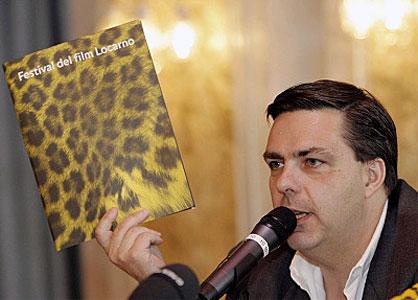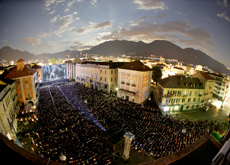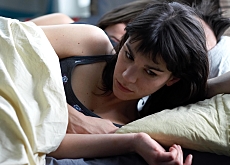Locarno remains festival of new cinema

The head of the Locarno film festival tells swissinfo that he wants the event, now in its 60th year, to retain its reputation for film discovery.
Frédéric Maire, who has only been in the job for two years, says that this year’s festival will be looking back at the glories of its past, while not forgetting about the films of the future.
The artistic director collapsed on stage last year after suffering from exhaustion and had to miss the final awards ceremony.
This time he is determined not to miss out on any part of the festival, which opens on Wednesday.
swissinfo: The festival is 60 years old this year. Can it be compared to a good wine that improves with age?
Frédéric Maire: Moving away from the wine comparison, I would say that Locarno does not age at all and essentially remains a youthful and very active festival. The dynamism and the colour green that characterise youth also define Locarno, which is always looking for new films, talents and trends.
swissinfo: How was this year’s festival organised?
F.M.: I was able to build on the success of last year, both among the public and in terms of international reputation. The films selected were well chosen – many of them actually went on to do very well internationally.
We have ensured that we have plenty of serious films and we are also offering a few nice surprises and events. We have already announced that it will be a knockout festival.
But we have encountered difficulties as well. I’ve rather had the impression that since it’s the 60th anniversary we have been organising two festivals at the same time.
swissinfo: How do you go about staging an anniversary festival? In the same way as a normal one or do you have to include some extra sparkle?
F.M.: My first concern is to organise a good collection of cinema from the point of view of quality and content. But every birthday should involve celebration, commemoration and pleasure. I’m aware of that. But for me, the real stars of the festival are and will always be the films.
However, this year the inclusion of certain films means that we can welcome some great film personalities as well. The festival will be paying tribute to the stars of Italian cinema with a special programme called “Signore & Signore”. We are organising this with Cinecittà [studios in Italy] and it covers 60 years of Italian cinema history.
We are hoping that some actresses will be present for this voyage into history, which will be like stepping onto our “virtual” red carpet. I say virtual because we don’t have one, we won’t get one, nor do we ever intend to get one. We’ve got a splendid white screen instead.
swissinfo: How would you characterise Locarno internationally, beyond the festival being a window for emerging cinema?
F.M.: We would like to be able to confirm Locarno as the festival of discovery. When we organised this year’s line-up, we realised just how many directors were discovered and launched their careers at Locarno, and subsequently went on to Venice or Cannes.
Locarno is a great festival, very professional but still modest, that prefers substance over a style, which dims over time. In this sense, Locarno should be able to insist on its diversity, which is a key word.
swissinfo: How would you sum up your experiences as artistic director during your first festival?
F.M.: When I first got up on stage in the Piazza Grande with my back to the screen and not looking at the screen as I did for years when I was a film critic, it was quite a funny feeling. I did ask myself what on earth I was doing there. But seconds later I realised that it was the right place for me.
When I rifled through the festival’s archives to prepare for this year’s event, I discovered with great pleasure that I was following the lead of previous directors… [with] the same idea of cinema – an authentic cinematic laboratory which is always on the move.
swissinfo: Which memory of last year would you like to keep and which one would you prefer to go away?
F.M.: The one I’d like to go away is easy… As you know for “technical” reasons (smiles) I stayed in hospital and couldn’t experience the end and the prize giving. I now have the impression that I didn’t really end the festival properly. I’d really like to do [that part] again.
There are many fantastic memories. But as I have to chose one, I’ll go for when [Finnish director] Aki Kaurismäki went up on stage – despite not wanting to out of shyness or fear – because he is a great director. Being on stage next to him, in front of a jubilant crowd, and a director who found it difficult to accept all these compliments and to see him so happy and emotional, was for me an unforgettable moment.
swissinfo, based on an Italian interview by Françoise Gehring in Locarno
The 60th Locarno Film Festival takes place from August 1-11.
There are around 80 films in the main official sections of the festival and 160 contributions in total.
There are around 80 international premieres, of which 20 are debut works.
30 countries are represented.
19 films are in the international competition, with one Swiss entry.
Swiss Cinema Day is on August 7.
35 Swiss films have been selected across the categories of the festival.
Frédéric Maire was born in 1961 in Neuchâtel. He has a Swiss father and Italian mother. A film critic, journalist and director, Maire was co-founder and director of the Magic Lantern film festival for children.
He has worked regularly with the festival since 1986 and has held several different posts. He was also a member of the programming committee (1997-2000).
His publications include “International Locarno Film Festival, Chronicle and Filmography, 10 years, 1988-1997” for the event’s 50th anniversary.
Since 2001 he has been member of the Federal Culture Office’s film support committee and was head of the same commission in 2004.
Maire was appointed artistic director of the Locarno International Film Festival in August 2005.

In compliance with the JTI standards
More: SWI swissinfo.ch certified by the Journalism Trust Initiative


You can find an overview of ongoing debates with our journalists here. Please join us!
If you want to start a conversation about a topic raised in this article or want to report factual errors, email us at english@swissinfo.ch.